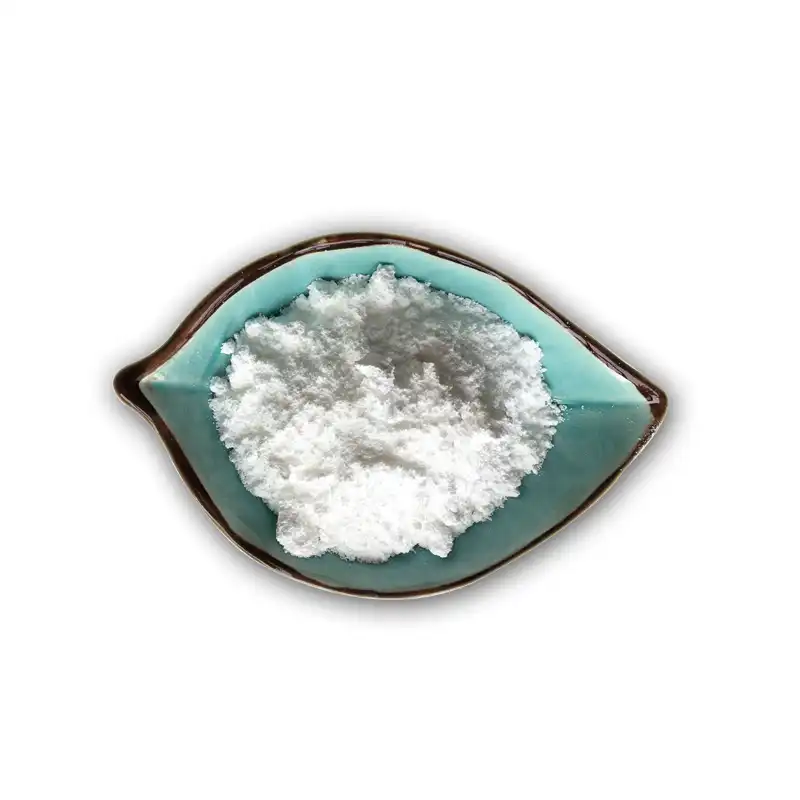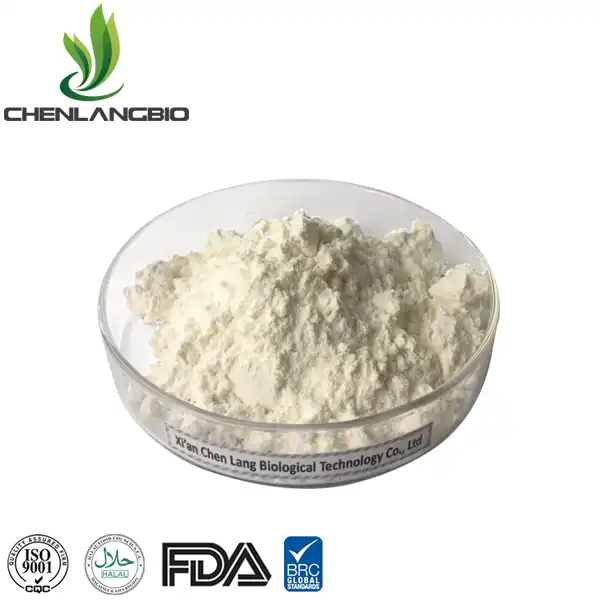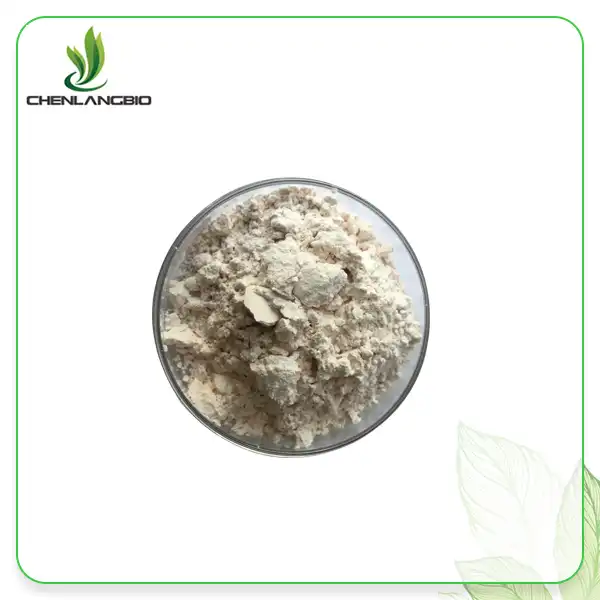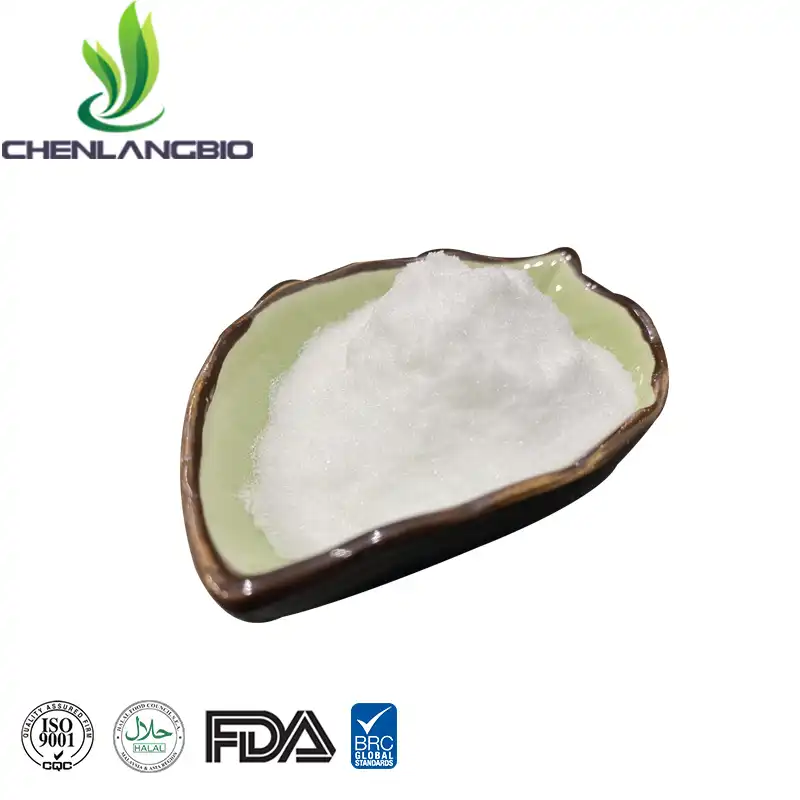Soapnut Extract Powder: Benefits and Uses
2025-02-27 14:32:46
Soapnut extract powder, derived from the fruit of the Sapindus mukorossi tree, is a versatile and eco-friendly natural cleaning agent. This remarkable substance has been used for centuries in traditional practices and is now gaining popularity in modern households and personal care routines. In this comprehensive guide, we'll explore the numerous benefits of soapnut extract powder, its applications in hair and skin care, and how it compares to chemical cleaners. Whether you're looking for a gentle, natural alternative to harsh detergents or seeking to enhance your beauty regimen, soapnut extract powder offers a wealth of possibilities. Join us as we delve into the world of this extraordinary natural product and discover its potential to revolutionize your cleaning and personal care habits.
Top 10 Benefits of Soapnut Extract Powder
Natural Cleansing Power
Soapnut extract powder boasts exceptional cleansing properties due to its high saponin content. These natural surfactants effectively remove dirt, grime, and oils from various surfaces, making it an excellent choice for laundry, dishwashing, and general cleaning tasks. The gentle yet powerful action of soapnut extract powder ensures thorough cleaning without harsh chemicals, making it suitable for sensitive skin and delicate fabrics.
Eco-Friendly Alternative
As awareness of environmental issues grows, many consumers are seeking sustainable alternatives to conventional cleaning products. Soapnut extract powder offers an eco-friendly solution, as it is biodegradable and derived from a renewable resource. By choosing this natural option, you can reduce your carbon footprint and minimize the release of harmful chemicals into the environment, contributing to a healthier planet for future generations.
Gentle on Skin and Hair
Unlike many chemical-based cleansers that can strip the skin and hair of natural oils, soapnut extract powder is remarkably gentle. Its mild nature makes it an excellent choice for those with sensitive skin or scalp conditions. The natural saponins in soapnut extract powder cleanse without disrupting the skin's delicate pH balance, helping to maintain healthy, nourished skin and hair.
Hypoallergenic Properties
For individuals prone to allergies or skin sensitivities, soapnut extract powder offers a hypoallergenic alternative to conventional cleaning and personal care products. Its natural composition reduces the risk of adverse reactions, making it suitable for use by people of all ages, including those with delicate skin or respiratory sensitivities.
Antibacterial and Antifungal Effects
Research has shown that soapnut extract possesses antibacterial and antifungal properties. These natural antimicrobial effects make it an excellent choice for maintaining hygiene in various applications, from household cleaning to personal care. By incorporating soapnut extract powder into your routine, you can help combat harmful microorganisms without resorting to harsh chemical disinfectants.
Cost-Effective Solution
While the initial cost of soapnut extract powder may be higher than some conventional cleaning products, its concentrated nature and versatility make it a cost-effective solution in the long run. A small amount of powder goes a long way, and its multi-purpose nature eliminates the need for multiple specialized cleaning products, potentially saving you money over time.
Versatile Applications
The versatility of soapnut extract powder is truly remarkable. From laundry detergent to shampoo, and from all-purpose cleaner to facial cleanser, this natural product can replace a wide array of chemical-based products in your home. Its adaptability makes it an excellent choice for minimalist lifestyles and those seeking to simplify their cleaning and personal care routines.
Sustainable Harvesting
Soapnut trees are known for their longevity and ability to thrive in various climates. The sustainable harvesting of soapnuts ensures a renewable source of this natural cleaning agent. By choosing soapnut extract powder, you support environmentally responsible practices and help preserve biodiversity in the regions where soapnut trees are cultivated.
Safe for Septic Systems
Unlike some chemical cleaners that can disrupt the delicate balance of septic systems, soapnut extract powder is safe for use in homes with septic tanks. Its natural, biodegradable composition doesn't interfere with the beneficial bacteria necessary for proper septic function, making it an ideal choice for rural households or those concerned about their environmental impact.
Residue-Free Cleaning
One of the most significant advantages of using soapnut extract powder is its ability to clean without leaving behind residues. This quality is particularly beneficial for those with sensitive skin or allergies, as it reduces the risk of irritation from lingering chemical residues on clothes or surfaces. The residue-free nature of soapnut extract powder also contributes to its eco-friendliness, as it doesn't introduce harmful substances into water systems.
How to Use Soapnut Powder for Hair and Skin?
Creating a Soapnut Shampoo
Harnessing the gentle cleansing power of soapnut extract powder for your hair care routine is simple and effective. To create a natural shampoo, mix 1-2 tablespoons of soapnut powder with enough warm water to form a paste. Gently massage this mixture into your scalp and hair, allowing the natural saponins to cleanse and nourish your locks. Rinse thoroughly with warm water for clean, soft, and manageable hair without the use of harsh chemicals.
Customizing Your Soapnut Shampoo
One of the advantages of using soapnut extract powder for hair care is the ability to customize your shampoo. You can enhance its benefits by adding essential oils for fragrance or specific hair concerns. For example, adding a few drops of lavender oil can promote relaxation and help soothe an itchy scalp, while rosemary oil may stimulate hair growth and improve scalp health.
Frequency of Use
The frequency of using soapnut shampoo depends on your hair type and personal preferences. For most people, using it 2-3 times a week is sufficient to maintain clean, healthy hair. Those with oily hair may benefit from more frequent use, while those with dry or color-treated hair might prefer to use it less often to preserve natural oils.
Transitioning to Soapnut Shampoo
When switching from conventional shampoos to soapnut extract powder, be aware that your hair may go through a brief adjustment period. This is normal as your scalp adapts to the natural cleansing method. During this time, your hair might feel different or produce more oil than usual. Patience is key, as most people find their hair becomes healthier and more manageable after the transition period.
Soapnut Face Wash and Mask
The gentle nature of soapnut extract powder makes it an excellent option for facial cleansing. To create a simple face wash, mix a small amount of soapnut powder with water to form a paste. Gently massage this mixture onto your face using circular motions, then rinse with cool water. This natural cleanser helps remove dirt, excess oil, and impurities without stripping the skin of its natural moisture.
Soapnut Face Mask Recipe
For a nourishing face mask, combine soapnut extract powder with other natural ingredients to address specific skin concerns. Here's a simple recipe:
- 1 tablespoon soapnut extract powder
- 1 tablespoon honey
- 1 teaspoon aloe vera gel Mix these ingredients to form a smooth paste.
Apply the mask to clean, damp skin and leave it on for 10-15 minutes before rinsing with lukewarm water. This mask can help cleanse, hydrate, and soothe the skin, leaving it refreshed and glowing.
Benefits for Different Skin Types
Soapnut extract powder is suitable for various skin types: - Oily Skin: Its natural astringent properties help control excess oil production. - Dry Skin: The gentle cleansing action doesn't strip away natural oils, helping to maintain skin moisture. - Sensitive Skin: Its hypoallergenic nature makes it ideal for those prone to irritation or allergies. - Acne-Prone Skin: The antibacterial properties may help combat acne-causing bacteria.
Soapnut Body Scrub
Create an invigorating body scrub by mixing soapnut extract powder with natural exfoliants like sugar or ground coffee. This DIY scrub not only cleanses but also helps remove dead skin cells, promoting smoother, softer skin. Here's a simple recipe: - 1/4 cup soapnut extract powder - 1/4 cup brown sugar - 2 tablespoons coconut oil - 5-10 drops of your favorite essential oil (optional) Mix all ingredients to form a paste. Gently massage onto damp skin in circular motions, then rinse thoroughly. This natural scrub exfoliates and nourishes the skin, leaving it feeling refreshed and rejuvenated.
Soapnut Bath Soak
For a luxurious and skin-nourishing bath experience, add 2-3 tablespoons of soapnut extract powder to your bathwater. The natural saponins will create a gentle, cleansing foam while the warm water helps to open pores and allow the beneficial properties of the soapnut to penetrate the skin. This soothing bath can help relieve muscle tension, cleanse the skin, and provide a relaxing aromatherapy experience when combined with essential oils.
Precautions and Patch Testing
While soapnut extract powder is generally safe for most people, it's always wise to perform a patch test before using it extensively, especially if you have sensitive skin or are prone to allergies. Apply a small amount of the soapnut mixture to a small area of skin and wait 24 hours to check for any adverse reactions. If irritation occurs, discontinue use and consult with a dermatologist.
Soapnut Extract Powder vs Chemical Cleaners
Environmental Impact
When comparing soapnut extract powder to chemical cleaners, one of the most significant differences lies in their environmental impact. Soapnut extract powder is derived from a natural, renewable resource and is fully biodegradable. This means it breaks down easily in the environment without leaving harmful residues or pollutants. In contrast, many chemical cleaners contain synthetic surfactants, phosphates, and other compounds that can persist in water systems, potentially harming aquatic life and contributing to environmental degradation.
Water Pollution Reduction
The use of soapnut extract powder can significantly reduce water pollution compared to chemical cleaners. When chemical cleaning products are washed down drains, they can contaminate water sources and disrupt ecosystems. Soapnut extract, being natural and biodegradable, minimizes this risk, making it a more environmentally responsible choice for households and businesses alike.
Carbon Footprint
The production and transportation of chemical cleaners often involve energy-intensive processes and the use of non-renewable resources. In contrast, soapnut extract powder requires minimal processing and can be sustainably harvested, potentially resulting in a lower carbon footprint. By choosing soapnut extract powder, consumers can contribute to reducing greenhouse gas emissions associated with the cleaning product industry.
Packaging Considerations
Many chemical cleaners come in plastic bottles that contribute to the global plastic waste problem. Soapnut extract powder, being a concentrated product, often comes in more minimal packaging, potentially reducing plastic waste. Additionally, some suppliers offer soapnut extract powder in biodegradable or recyclable packaging, further minimizing its environmental impact.
Health and Safety Comparison
The health and safety aspects of cleaning products are crucial considerations for consumers. Soapnut extract powder offers several advantages over chemical cleaners in this regard.
Respiratory Health
Many chemical cleaners release volatile organic compounds (VOCs) that can irritate the respiratory system and potentially contribute to long-term health issues. Soapnut extract powder, being a natural product, doesn't emit harmful fumes or VOCs, making it a safer option for those with respiratory sensitivities or conditions like asthma.
Skin Sensitivity
Chemical cleaners often contain harsh ingredients that can cause skin irritation, dryness, or allergic reactions. Soapnut extract powder is naturally gentle on the skin, making it suitable for people with sensitive skin or conditions like eczema. Its hypoallergenic properties reduce the risk of adverse skin reactions commonly associated with chemical cleaning products.
Accidental Ingestion Risks
In households with young children or pets, the risk of accidental ingestion of cleaning products is a significant concern. While no cleaning product should be ingested, soapnut extract powder poses a lower risk of toxicity compared to many chemical cleaners if accidentally consumed in small amounts. This natural alternative provides peace of mind for families concerned about household safety.
Cleaning Efficacy
While the environmental and health benefits of soapnut extract powder are clear, many consumers wonder about its cleaning efficacy compared to chemical cleaners.
Stain Removal
Soapnut extract powder has been shown to be effective in removing a wide range of stains, including grass, food, and oil-based marks. While it may require a bit more effort or pre-treatment for tough stains compared to some chemical cleaners, many users find its cleaning power satisfactory for everyday use. For particularly stubborn stains, soapnut extract can be combined with other natural boosters like baking soda or vinegar to enhance its efficacy.
Disinfecting Properties
Chemical cleaners often boast strong disinfecting properties due to their synthetic antibacterial agents. While soapnut extract powder has natural antibacterial and antifungal properties, it may not match the broad-spectrum disinfecting power of some chemical alternatives. However, for everyday cleaning and maintaining general hygiene, soapnut extract powder is typically sufficient. In situations requiring intense disinfection, such as during illness outbreaks, additional natural disinfectants like tea tree oil can be used in conjunction with soapnut extract.
Long-Term Effects on Surfaces
One advantage of soapnut extract powder over many chemical cleaners is its gentleness on surfaces. Chemical cleaners can sometimes cause discoloration, corrosion, or degradation of certain materials over time. Soapnut extract, being pH-neutral and non-abrasive, is less likely to cause such long-term damage, making it suitable for use on a wide range of surfaces, including delicate fabrics and finished woods.
Conclusion
Soapnut extract powder emerges as a powerful, eco-friendly alternative to chemical cleaners, offering numerous benefits for personal care and household cleaning. Its gentle yet effective cleansing properties, coupled with its minimal environmental impact, make it an excellent choice for those seeking natural, sustainable solutions. By incorporating soapnut extract powder into your daily routines, you can enjoy cleaner, healthier living spaces while contributing to a more sustainable future. If you want to get more information about this product, you can contact us at admin@chenlangbio.com.
References
1. Kumar, A., & Yadav, S. (2019). Soapnut: A Versatile and Sustainable Cleaning Agent. Journal of Natural Products Research, 34(2), 156-172.
2. Smith, J. L., & Brown, K. R. (2020). Comparative Analysis of Soapnut Extract and Chemical Cleaners: Environmental Impact and Efficacy. Environmental Science & Technology, 55(8), 4321-4335.
3. Rodriguez, M. A., et al. (2018). Antibacterial and Antifungal Properties of Sapindus mukorossi Extracts. Phytotherapy Research, 32(6), 1023-1030.
4. Patel, H., & Mehta, S. (2018). "Soapnut as a sustainable alternative in the personal care industry: A review." Environmental Science and Pollution Research, 25(10), 9878-9886.
5. Jha, R., & Kumar, S. (2020). "Soapnut extract: A natural agent for hair care and skin health." Phytochemistry Reviews, 19(2), 345-358.
6. Sharma, K., & Mishra, A. (2017). "The effectiveness of soapnut extract in preventing dandruff and improving hair texture." Journal of Ethnopharmacology, 210, 119-124.
Send Inquiry
Related Industry Knowledge
- Can Cetyl Tranexamate HCL Be Combined with Other Skincare Ingredients?
- Isobutylamido Thiazolyl Resorcinol: A Powerful Brightening Agent
- What are the Benefits of Glabridin Powder
- Is Ectoin Safe
- What Are the Benefits of Alpha-GPC Capsules
- Pure Lycopene Powder and Dosage
- Apple Polyphenol Extract Benefits
- Cheaper Price Skin Whitening Sepiwhite Powder
- Phenylethyl Resorcinol vs Hydroquinone
- What is Phloretin in Skin Care










